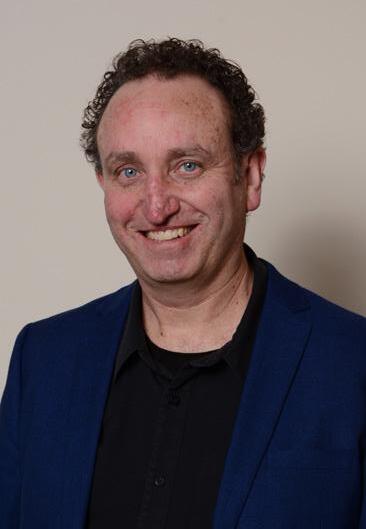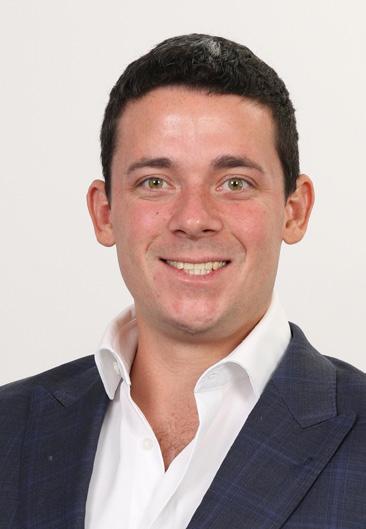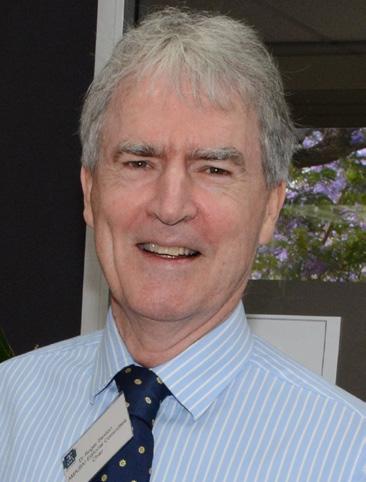AMA(SA) Intern Guide 2024

Helping you navigate your first weeks as an intern.





Helping you navigate your first weeks as an intern.



 Dr John Williams President, AMA(SA)
Dr John Williams President, AMA(SA)

On behalf of all your colleagues in the Australian Medical Association, congratulations on taking this huge step in your medical career. You may have wanted to be a doctor since early childhood, or developed a keen interest as your scientific studies continued at school – either way, you have been preparing for this for a long time. Internship is not the beginning of your journey, but it is the beginning of your ‘career’.
As a GP and long-time AMA member, I truly believe there is no more important profession than medicine. We doctors are in a unique position. Over the course of our patients’ lives – or even during one 30-minute consultation – we may be clinician, counsellor, advocate. I hope you begin your internship with a passion for caring for your patients and a determination that you will do what you want to make them healthier.
I also hope you will maintain a close relationship with the AMA. We are also in a unique position: as the only organisation representing all doctors, we advocate for and with clinicians across the profession to improve the profession and the working conditions for its members, while doing all we can for our patients. The past four years have shown the value of the AMA and its status and influence – but to retain that influence we depend on you.
Please stay with us to amplify the credence of our advocacy on the path through your medical career. We’ll be here for you for every step along the way.
 Dr Hayden Cain Chair, AMA(SA) Doctors in Training Committee
Dr Hayden Cain Chair, AMA(SA) Doctors in Training Committee
Congratulations!!! You’ve done it!!! After years of sacrifice and study, with hopefully a bit of fun sprinkled in there as well, it’s time for the daunting transition from medical student to intern to begin. While it might be a huge step, internship can be one of the best years of your life – if you allow it to be. The friendships you form with your fellow interns and the colleagues in the teams you rotate through will last your entire career. They’ll help form a support network that will help you through the tougher times. It may seem as if you need to focus on securing those key rotations, studying for exams and curating references, but please don’t forget to enjoy yourself and sometimes sit back and appreciate how much you have already achieved. Medicine is an amazing career. I feel that it is important that we all take time to focus on why we do it: our patients. We need to remind ourselves during the tougher times how lucky we are to work in a career in which we constantly learn and grow as clinicians while interacting with and helping patients every day.
I wish you all the best of luck embarking on this next stage of your medical journey. I hope you have as great a time as an intern as I did and make the most out of every opportunity!
The AMA is the peak membership organisation for doctors in Australia. We represent the medical profession in discussions and debate with government, policy makers, other health and community organisations and the media.
Our advocacy ensures Australians have access to quality health care, when and where they need it. It’s important for giving doctors a strong, united voice in debate about the legislation, policy, funding and services that our patients and communities need. And – largely because of the credibility we’ve built over many decades in fighting for our patients and a better health system – it’s important when we want to explain issues that directly affect our members.
Those members are like you. They’re students, interns, registrars and experienced doctors; they’re at university, or working in hospitals or practices in cities, towns and remote areas of South Australia.
And, like you, they work better knowing they are part of a team, among people who understand the highs and lows of our profession. The AMA can be a source of information, guidance, comfort and support – or all four, and more.
Studies have found that Australians trust their doctors more than they trust any other professionals. That trust comes from consultations between people, their doctors and their families. It also comes from Australians knowing what doctors do and what they stand for. That’s because of the AMA.
The AMA (SA) is here for all South Australian doctors, doctors in training and student doctors. As
part of the community, you can draw on the network that is ready and able to influence politicians, academics, the media and communities. And when you’re ready, you can join your peers in expressing your ideas to improve our profession and the health care of all Australians.
The AMA(SA) is influential because we speak for all doctors in this state.
In recent months, the AMA in South Australia has spoken out about issues vital to the future of doctors’ working conditions and the profession itself, including:
• the impact of climate change on health, and the health system on climate change
• new interpretations of payroll tax and what they mean for private practice
• the introduction of pharmacy prescribing of UTI medication in South Australia.
Whether you are a medical student, starting out in your career, establishing your own practice, working in a large hospital or remote community, we are here to support you every step of the way.
As an AMA(SA) member you have access to a range of free and discounted resources and services to support you, plus professional development opportunities, and advice on workplace and career matters.
Join us now – and ensure that when we speak, we’re speaking for you.

The camaraderie with colleagues has been the most memorable aspect of the first year of life as a doctor for 2022 AMA(SA) Student Medal winner Dr Kritika Mishra.
Welcome to our newest colleagues. Take a deep breath and smile. You made it!
Day 1 of internship is indescribable. Feeling simultaneously prepared and uncertain, enthusiastic yet apprehensive, and eager to learn yet entirely unknowledgeable is normal. This dichotomy of emotions is precisely why we embark on internship, where we are trainee medical officers. Yes, you are here to work, but you are not expected to have all the answers.
So, what can you expect from the year ahead? To be honest, in the beginning, just try and get through one day at a time. After a few weeks, you will settle in. I promise you, as the year progresses every transition from one team to another will become slightly easier. You will become more comfortable with admitting that you don’t know, making mistakes and asking for help. The best doctors are humble, honest and open to learning. You don’t need to know everything. You just need to be willing to work hard and learn.

Undoubtedly, the best part of this year has been the wonderful people I have met. The camaraderie we've shared, along with the myriad ways in which we've connected with our colleagues, has made the year so much fun! The impact that an intern has on team culture is underestimated and understated. I encourage you all to bring your unique personalities to the team, and equally be open to the diverse personalities of your colleagues. Learning to adapt to various team dynamics is a valuable skill to master.
Along with your personality, you will also bring a wealth of knowledge and skills. Use your critical thinking skills, advocate for your patients, lead multidisciplinary teams and be proactive in the care you provide. Do not underestimate the importance of your communication, actions and clinical judgement.
Admittedly, at some points during the year, you will feel exhausted. So, what do you do? Have a coffee, debrief with your trusted RMOs and registrars, make sure you have applied for annual leave, take your sick leave, and please tell your colleagues if you are not feeling well. Help them help you take care of yourselves.
You will perhaps look back and laugh at the crazy, chaotic parts of your journey – be it the ward rounds averaging any time between three minutes and eight hours, the tantrums you throw with your co-intern every time you get called from pre-ads, the sick patients you see on cover who are way beyond your scope of management, the sea of emails that drown you, the patient who needs an urgent jelco with no palpable veins in their body, being ask for mods when you can’t do mods, becoming unhealthily desperate for a coffee break, and the pager going off every two seconds when you are in the middle of a procedure and physically cannot answer it. We’ve all been there. But please, if you need help, ask. Ask a friend, a colleague, ask me. We’ve got each other. We’re a team.
So, welcome aboard! Step boldly into this next part of your career and have faith in your capabilities. The responsibility that comes with the two letters, ‘D’ and ‘R’, that form your new title is immense, but the medical profession needs and eagerly awaits your skills, knowledge and energy. Bring your full potential to the table and savour every moment of this remarkable journey. Before you know it, you’ll be running with the wind.

Congratulations on graduating from medical school and becoming doctors! This is a huge achievement and opens so many doors. No matter which career path you take from here, you have the opportunity to create a bright, interesting, fulfilling and meaningful future.
Internship can be challenging as you take on new responsibilities and work long hours, sometimes alongside interesting personalities. You absolutely have what it takes. You know the medicine you need to know to be an intern. Often the hardest part is learning the logistics of how a particular team and site function, but you’ll pick this up quickly. Don’t be afraid to ask questions. Now is the time for questions. Ask as many questions as you can, as people expect this of you now. Every day is an opportunity to learn something new.
One of the best parts of medicine is the sense of community it offers. You’ll be part of a team that helps, supports and learns from each other. More broadly there is a sense of camaraderie amongst doctors who have been through similar experiences, including the difficult ones such as the death of a patient, trying to navigate the training bottleneck or being treated poorly at work.
The culture of medicine has had its issues, but things are changing. Poor culture has been called out and there is investment from bodies such as the Medical Board, the AMA and Medical Colleges to try and change things. Here in South Australia, the AMA helped develop legislation that now dictates that hospital boards are responsible for the wellbeing of their staff – and this includes you. While the work of a doctor in training is inherently challenging, bullying, discrimination, racism and harassment, including sexual harassment, are never ok and should be called out. Groups like the AMA can support you if you experience unacceptable behaviours. The AMA has been advocating strongly for improved psychosocial safety in medical workplaces, and organisations are listening.
As a medical student I was involved with the Australian Medical Students’ Association (AMSA) and was the Flinders Medical Students’ Society’s AMSA representative. Due to my frustration with the training bottleneck and the lack of sustainability in healthcare, I became involved with the AMA in PGY3 and have been involved ever since. Becoming involved with the AMA while you’re
a doctor in training is a great opportunity for networking and making friends, gaining a better understanding for how healthcare and medical training systems work, developing leadership skills and creating change. Don’t feel as though you are too junior to contribute. You are an expert in what it is like to be a junior doctor now, and that perspective is valuable.
For now, enjoy the celebrations! Enjoy starting work as a doctor. Enjoy your new income, meeting new people and making new friends, caring for patients and finding how rewarding your work can be. Look after yourself and your colleagues. Discover which parts of medicine you like and which you don’t and start to shape a career that feels right for you.

There are many sources of help for interns in South Australia’s hospitals, including within your new working environments, explains Royal Adelaide Hospital Medical Education OfficerInterns Peta Beckham.
Making the transition from medical student to intern is a very exciting time in your medical career. Finally, the years of study, sacrifice and hard work have paid off and you are a doctor.
Starting internship will no doubt bring about lots of questions. Can I do this? Am I truly prepared? When will I get to impress everyone with my knowledge of the Krebs cycle? Perhaps most importantly, where can I turn for support when I need it?
While your colleagues and peers may be fantastic sources of support and are often willing to provide advice and counselling, there may be times when a higher level of support is needed. Within each Local Health Network are medical education units, or trainee medical officer units. You may have already had some contact with these teams in preparation for starting your internship. Some members of these teams include directors of clinical training and medical education officers. It will be helpful to know who they are and how they can support you.
A DCT is a senior clinician within your LHN. DCTs are expert clinical educators, and they are responsible for the training and education of prevocational trainees. They are advocates for trainees and work to ensure excellent educational standards. Your DCT is also a great resource for you and can assist with any questions or concerns, career guidance, and well-being support, along with helping with remediation strategies if you encounter any struggles along the way.
MEOs work very closely with the DCT. While the role is multifaceted, and responsibilities can vary from site to site, one of the most important aspects of the role is to provide support and guidance to interns as they navigate the transition from student to Intern, and TMOs as they progress through their careers into specialty training pathways.

The support offered by the DCT and MEO can come in various forms and is tailored to your specific needs. It ranges from a straightforward phone call or conversation, to facilitating referrals to external medical services like your general practitioner or a psychologist. It can also involve collaboratively addressing any challenges and formulating effective solutions to enhance your overall well-being and support your career and professional development.
The support provided by the DCT and MEO can start before your internship commences through the Transfer of Information process. This process enables medical students to reach out to the DCT and MEO to facilitate discussions about any concerns or issues that you believe may have an impact on your upcoming intern year. The aim of this process is to set you up for success during your internship by proactively putting in place strategies to ensure that you are provided with the best opportunities to learn and develop your clinical skills over the course of the year. https://www.samet.org. au/reports-and-resources/resources/transfer-ofinformation/
As a Medical Education Officer, being able to provide individual support and work closely with TMOs to progress successfully through the intern year is extremely rewarding. There is a great satisfaction that comes from witnessing the growth and development that happens from the very first day, when everyone walks into orientation feeling nervous, excited and perhaps a bit apprehensive, to seeing everyone evolve into skilled, compassionate and confident medical professionals, ready to take on their careers beyond internship.
If you want to reach out to your DCT or MEO, SAMET (South Australian Medical Education and Training) has a list of all LHN contacts https://www. samet.org.au/doctors-in-training-intro/contacts/.
Thanks to AMA(SA) President Dr John Williams, intern Dr Jayanthi Selvam, and students Ms Natalie Kanter, Ms Harsimran Kaur, Ms Elizabeth Johnson, Ms Claudia Haeusler, Ms Kritika Mishra, Ms Amy Langdon for making themselves available for photography and to Brett Sheridan of Blue Razoo for the images. Thanks also to CALHN Medical Education Unit for arraning the venue.

It’s important that junior doctors understand and comply with Ahpra requirements, writes State Manager Pat Maher.
Congratulations on starting your journey as a registered medical practitioner! I hope the introductory information below will help guide you in the initial stages of your career.
The Medical Board works with the Australian Health Practitioner Regulation Agency (Ahpra) to help protect the public by regulating Australia's registered medical practitioners. Public safety is always our number one priority. Every decision we make is guided by the Health Practitioner Regulation National Law (the National Law), as in force in each state and territory.
The Medical Board and Ahpra have five core regulatory functions:
Professional standards – We publish registration standards, codes and guidelines for medical practitioners to support safe practice
Registration - we ensure that only medical practitioners with the skills and qualifications to provide competent and ethical care are registered to practise. We manage the registration and renewal processes for local and overseas qualified medical
practitioners and manage student registration. We publish a national Register of practitioners so that important information about individual health practitioners is available to the public.
Notifications - We manage complaints and concerns raised about the health, performance and conduct of individual medical practitioners on behalf of the National Boards, except in NSW and Queensland where we only manage the notifications referred to us. We work with SA Health and the Health and Community Services Complaints Commissioner to make sure the appropriate organisation deals with the community’s concerns about medical practitioners.
Compliance - We monitor and audit registered medical practitioners to make sure they are complying with Board requirements.
Accreditation - We work with accreditation authorities and committees to ensure graduating students are suitably qualified and skilled to apply to register as medical practitioners.
When becoming a registered medical practitioner there are five core registration standards you should be aware of:

■ Continuing Professional Development - All registered medical practitioners are required to participate regularly in continuing professional development (CPD) that is relevant to their scope of practice. This involves maintaining, developing, updating and enhancing their knowledge, skills and performance to ensure they deliver appropriate and safe care. The CPD requirements that medical practitioners must comply with depend on the type of registration that they hold and on the stage of their career.
■ English language skills - This registration standard applies to all applicants for initial registration. All internationally qualified applicants for medical registration, or applicants who qualified for medical registration in Australia but did not complete their secondary education in English, must demonstrate that they have the necessary English language skills for registration purposes.
■ Recency of practice - To ensure that they are able to practise competently and safely, medical practitioners must have recent practice in the fields in which they intend to work during the period of registration for which they are applying. To meet the standard, they must have practised within their scope of practice for a minimum total of:
• four weeks full-time equivalent in one year, which is a total of 152 hours, or
• 12 weeks full-time equivalent over three consecutive years, which is a total of 456 hours.
■ Professional indemnity insurance - All registered medical practitioners who provide
health care or medical opinion in respect of the physical or mental health of any person, must ensure all aspects of their medical practice are covered by professional indemnity insurance (PII), or some alternative form of indemnity cover that complies with the Board’s registration standard for professional indemnity insurance.
■ Criminal history - All registered health practitioners must inform their National Board if they are:
• charged with an offence punishable by 12 months imprisonment or more, or
• convicted or found guilty of an offence punishable by imprisonment in Australia and/or overseas.
■ Also, when practitioners renew their registration they must disclose any changes to their criminal history.
At every renewal cycle you will be asked to make a declaration in line with the Board’s registration standards.
The Medical Board has recently released a fourpart series of self-paced education modules on regulation and professionalism for final-year medical students. The modules are available through the Medical Board website and highlight the importance of professionalism and good communication, because these are at the heart of most patient complaints (notifications) about doctors.
While the modules are aimed at medical students, junior doctors may also find them informative. The content includes registration and notification data, case studies, stories and commentary from doctors and members of the public, information about how notifications are handled, and the different organisations involved in regulation.

You’ll soon learn the value of practising some helpful behaviours and making them habits early in your internship writes Dr
Tom GransburyOrganisational
1. Receive a good rotation handover from the outgoing intern (see the AMA handover guide on page11).
2. Obtain your pager and page yourself to check it’s working.
3. Make sure you are a member of the team group chat (e.g., Whatsapp, Teams, etc.).
4. Ask your team for time to complete your mandatory training during work hours.
5. Claim unrostered overtime if you’ve worked it (and find out how to get it approved). Talk to your team early if you’re regularly needing to stay back for more than an hour and see how you can better distribute the workload.
Networks
6. Meet and get to know your allied health staff! They will be incredibly helpful with navigating complex systems.
7. Get to know your TMO (Trainee Medical Officers) Unit/Post-gradual Medical Education Unit as helpful ‘first port of call’ with internship issues.
8. Remember your medical students and organise teaching for them if you can. You are best placed to know what is useful for them.
9. Think about who you want to be your referee and update your CV and approach them while on rotation.
10. Try and take lunch breaks away from your computer. Ideally prepare the meal ahead of time and take the time to eat well. Meal services can help when you are time poor.
11. Leave on time.
• Don’t feel guilty about handing over tasks –leave a clear plan for what the next doctor should do.
• Prompt your team for a paper round early in the afternoon to go through the patient list, new test results and outstanding jobs.
• Be prepared to ask nurses to page cover rather than doing jobs ‘while you’re here’ when you should have left an hour ago.
• If you’ve left and forgotten something, call cover to check instead of opening EPAS mobile. Leave work at work!
12. Give your resident your pager during your protected teaching time.
13. If you are sick, take a sick day. Your team can manage without you. Your patients also don’t need your infection!
14. If you receive a call about your patients on a rostered day off, interrupt the person and redirect them to whoever is working that day (or don’t answer the call).
15. Ask another intern to co-certify with you for your first death.
16. Ask to debrief about distressing cases. Registrars may forget that you could need debriefing after an incident with an aggressive patient or after your first patient death. Seek outside help if you think you may need it, from your GP, Hand-n-Hand, Employee Assistance Program or Doctor’s Health SA.
17. Ensure discharge summaries have up-to-date lists of medications on discharge.
18. Find out to whom you should escalate difficult cannulas and how to organise midlines/PICCs.
19. Ensure you’re comfortable donning/doffing specific to your site for COVID precautions.
20. Learn these quick EPAS tricks:
• Save all the COMMON. CORE. ED. GAST. HAEM. NEUR. RESP. and SURG. PreOperative order sets to your favourites list. Set this as your default ordering screen.
• Import a list of ‘common discharge diagnoses’ as favourites, along with useful cover acronym expansions from the previous intern.
• Set up an ‘advanced’ EPAS list to display ‘incomplete’ and ‘not started’ discharge summaries for your rotation dates.
• Know the different ways to recover a ward round note on EPAS (including a drop-down box called ‘document recovery’ when entering a new document).
• You can also add a column, for ‘Physio/Social Work/etc.’ assessment status that tells you if they have been referred.
The AMA(SA) Doctors in Training Committee’s annual Hospital Health Check (HHC) aims to improve working conditions for the state’s junior doctors.
The AMA works to improve the working conditions and professional experiences of junior doctors.
In 2023, the AMA(SA) Doctors in Training Committee again used the Ahpra Medical Training Survey (MTS) to gather and analyse data about workplace issues ranging from access to leave to bullying and harassment.
This year’s HHC found that bullying and harassment are still major issues for DiTs both in SA and around Australia. Most South Australian public hospitals had rates of junior doctors who had been personally bullied or harassed in the past 12 months ranging from 21 to 24%.
The rates of junior doctors witnessing bullying or harassment were even higher, indicating that junior doctors may not always report bullying or harassment when it happens to them. A look at the reported perpetrators suggests why this may be the case. The survey found that senior clinicians are by


far the most common perpetrators, meaning junior doctors may be worried about the effect of reporting on their careers. And most say they believe nothing will be done.
The MTS data clearly shows there are many major issues affecting DiTs in South Australia, from local staffing and resource issues to the toxic cultural and bullying problems in medicine – issues that if not tackled soon will only worsen.
Still, there are positive findings. First, the Vanderbilt program introduced in CALHN appears to be increasing the likelihood that DiTs will report bullying. Second, despite the current issues, we have a higher rate than the nation average of recommending our current workplaces.
The AMA(SA) DiT Committee is using this data to advocate for change, including:
• providing adequate work and teaching spaces at all sites
• ensuring access to necessities for career progression such as study leave for all doctors
• encouraging close monitoring the progress of the Vanderbilt system and the viability of rolling it out to all SA Health sites.
We’re also capitalising on our representation on the AMA(SA) Council to ensure the issues and challenges facing junior doctors are front and centre in the minds and decisions of our senior colleagues. President Dr John Williams and Council Chair Dr Hannah Szewczyk (herself a junior doctor) guarantee our voices are heard, such that our concerns make their way to the agendas of meetings with the Health Minister and SA Health leaders.
We want public hospitals to be safe, nurturing environments in which we learn to practise medicine.

You bring many personal qualities and personal experiences into medicine. These include your IQ, your own levels of emotional intelligence and resilience, time management skills, motivation and personality traits. Your training hones your interpersonal skills and professional knowledge through graded exposure to a vast range of clinical situations as your progress through the course.
There are many stressful career transition points that test our skills and mettle along the way. For you, these may include the first year of medical school, final examinations, internship, competitive entry into specialist training programs, fellowship examinations, pregnancy, migration and entry into private practice and long-term employment.
However, there are steps that you can take to prepare for these stressful points and anticipate and mitigate the impact on your health of this constant . At Doctors’ Health SA we have seen at least 10 key things healthy doctors do to maintain their wellbeing under these circumstances.
1. Have a GP. Finding a GP to suit you can take time but it’s worth it. Your GP will advocate for you in the health system and connect you with relevant and independent referral networks. Book several longer appointments in the first instance as it is unrealistic to expect everything to be sorted out in one visit.
2. Attend to the basics. Your basic human needs for sleep, water, food, sunlight and exercise must be met. Eat healthy, regular meals. Build excercise into everything you do and go outside on breaks. Prioritise at least seven hours of restorative sleep a night, as often as possible.
3. Have interests outside medicine – Doctors are very often creative people who need to express themselves through art, music, reading and writing. Social recreation with non-medical people is essential for a balanced week. Make time for friends and family and talk about topics not related to your work.
4. Practise relaxation at work through mindfulness and meditation, walking and taking breaks, listening to music and above all, enjoying their stories that can be so inspiring. Relish any praise your colleagues and patients give you.

5. Establish a group of professional advisors – your GP, your accountant, psychologist. A mentor is very worthwhile. Doctors need to ‘get good advice’.
6. Anticipate stress well ahead in high-pressure situations and examination periods. Prioritise the essentials of sleep, good food and exercise by establishing these habits well in advance. Seek the advice and treatment of your GP and/ or clinical psychologist if anxiety is becoming intrusive.
7. Practise very good time management. Don’t procrastinate. Use the 4D approach to other people’s requests for your time.
• Do it, now and don’t allow tasks to accumulate.
• Ditch it, by saying ‘no’.
• Defer it, to allow time to consider if it works for you. Then say ‘no’!
• Delegate it.
8. Plan holidays well ahead and find restorative value in short breaks such as an overnight stay. Lots of little breaks add up.
9. Have an annual check-up so your preventative checks are done.
10. Recognise your own warning signs of duress and have a plan for who you can call upon at those times.
Healthy doctors practise better medicine with better outcomes. Doctors’ Health SA is the health program established by SA doctors in 2010 to assist South Australian doctors and medical students with their health. Doctors’ Health SA can help by providing you with an initial comprehensive health assessment and access to a doctor in our GP network for your future care.
Visit our website at www.doctorshealthsa.com.au to see the program activities and where to seek advice and look for Doctors’ Health SA on LinkedIn and Facebook.
- Dr Roger Sexton is the medical director of Doctors’ Health SA.


The AMA(SA) Doctors in Training Committee have developed a resource to help you understand the different committees, networks and forums in junior doctor workplaces.
Scan the QR code to view or download a copy from the AMA(SA) website.




What details should you know about patients you are taking over care for?
• Request a copy of the OACIS/ EMR sheet with all current inpatients
• Discuss each patient making sure to take note of:
1. Patient name/location
2. Current diagnosis
3. Key preceding/current events
4. Past medical history/current problem list
5. Outstanding tasks requiring completion in order of priority
6. Expected length of stay (e.g. 24 hours, days, weeks, months)
What does the weekly timetable look like?
• What time should you arrive to prepare for the ward round/day ahead (e.g. printing notes)?
• Timing of ward rounds, consultant ward rounds, huddles, pre-admission clinics, OPDs, theatre sessions, allied health meetings
• General idea of weekly hours
• What are the weekend/afterhours requirements for the rotation?
• When are the MDT/unit meetings?
• Where and when to drop off/ who to email
• Process for applying for overtime approval
• Rosters
• Who organises the roster?
• When is it sent out?
• How to arrange shift swaps?
What are your clinical responsibilities?
• What is your role required to do on the ward round?
• Is there a requirement to participate in pre-admission clinics?
• Post-operative reviews?
• Are there any weekend ward rounds you have to do alone/ without direct oversight?
• Participating in MET shifts?
• Where do you drop off forms for morning bloods?
• Where/how do you hand over for COVER and NIGHTS?
What to do in preparation for a handover?
• Where can you find the handover docs/term descriptions?
What do we need to discuss regarding unit structure?
• Who is the term supervisor?
• Names and contact details of consultants, registrars and residents on the team
• Names and contact details of speciality nurses and outline their role
• How does the team communicate e.g. WhatsApp or another messaging platform? Ask to be added where applicable!
• Name of the nurse clinic unit manager
• Introducing yourself prior to commencing or at the start of your rotation is highly recommended
What are the administrative responsibilities?
• What is your role in discharge planning?
• Do you have to chase any
results for recently discharged patients?
• How to book outpatient appointments for patients being discharged both for your unit and other specialties
• Are there any meetings you are required to organise/book rooms for?
• Are there any outstanding discharge summaries not yet completed?
• Expectations regarding discharge summaries: patient leaves with summary in hand or within 24/48 hours?
• Hot tip - does the unit have a specific template for D/C summaries
Unit specific requirements
• Does the unit prefer to use EMR/ OACIS sheets for handover? Is there any specific information the unit needs included?
• If you’re unfamiliar with how to set up lists, request your predecessor to show you!
• In your role, are you required to give any presentations at meetings during the rotation?
• Where is the morning bloods tray, what time is the bloods round, is there a weekend bloods round?
• Do a walk-through - where is the team office, the meeting rooms and where does the team meet for ward rounds etc.
• Assessments - who is your supervisor
Anything you feel is important
• The team’s favourite coffee spot
• Is food provided at unit meetings?
• Common patient problems/calls specific to the unit
• Acronym expansions (for Sunrise users)
The AMA has customised programs to support interns’ career developments.
High-quality, tailored professional development is essential to every intern’s career progression.
Through the AMA’s Victorian branch, the AMA offers customised development services for interns and doctors in training, including coaching, education, and resources. These empower interns to make informed career decisions, reach your professional goals, and unlock your potential. AMA members enjoy discounts.
AMA offers exclusive member services to interns, including complimentary 15-minute coaching consults via Zoom. These services aim to support our Doctor in Training members' professional growth and address common challenges doctors face throughout their careers.
The 'Career Call' service has been designed exclusively for fee-paying members of AMA. This valuable resource offers medical professionals the chance to engage with our experienced, independent, and objective career consultants. During a focused 15-minute discussion, tailored to your schedule, you can explore various aspects of your career. These sessions are conducted through Zoom or telephone.
The 15-minute Resume Review, an exclusive member benefit for AMA members, is an opportunity to receive from an AMA career consultant real-time feedback on your resume, as well as advice and direction on how to improve it. The resume check-up is a consultative process involving the member and coach over the telephone or via Zoom.
https://www.ama.com.au/career-advancement
Our Career Coaching services empower interns and DiTs to assess potential career pathways, gain insights into your unique abilities, build career tools and skills, obtain desired roles and support your transition to consultant.
Career coaching services that support you to ‘Reflect, assess, decide, plan and act...’ focus on:
■ Choosing a specialty pathway
■ Medical Career planning
■ Career transition for doctors
■ Career coaching consult
■ Career coaching program. Career coaching services that support you to ‘Develop career tools, skills and capability...’:
■ Professional branding 101
■ Resumes, applications & cover letters
■ Practice Interview
■ Interview training 1:1
■ Interview coaching with a panel.
Leadership in healthcare is crucial for effective collaborative care, including in formal roles. The AMA’s leadership programs help interns and DiTs develop leadership skills, ensuring effective contributions to healthcare.
We offer leadership coaching and a range of resources specific to your career stage:
■ Leadership coaching consult
■ Doctor in Training Coaching program.
■ Performane coaching
Medical masterclasses
Continuous professional development is crucial a mandatory requirement for registration from PGY3. These programs offer vital knowledge, skills, mentorship, and practical experiences, enhancing doctors' careers and patient care. Each program is CPD-accredited.
Member education sessions:
■ Career Sessions – resumes & cover letters, interview skills, Linked In
■ Masterclass - difficult interactions, feedback 101, advocacy of self
■ Future proof your career - how to avoid Ahpra notifications and registration issues. Professional development programs:
■ Emerging Leader Professional Development Program
■ Communication skills for effective health care delivery
■ Creating psychological safety at work. For more information about AMA Career Services, go to https://amavic.com.au/professionaldevelopment-and-careers
You’ve completed years of study and are starting out as a Resident Medical Officer (RMO) – and you’re at the beginning of your earning journey. There are things you should be aware of in managing your income and preparing for the road ahead.
There are many things you will want to consider but of course it’s different for every intern, so we always suggest you ask your accountant for guidance specific to your situation.
The first things you will need to understand are income tax and the deductions that you can claim. Here are a few tips on what’s important once you start receiving your fortnightly salary.
1. You will need to lodge an income tax return for the financial year ending 30 June. Your return is due for lodgement by 31 October, or later only if a registered tax agent prepares your return
2. Your tax return includes taxable income, which is assessable income less allowable deductions.
3. Assessable income includes:
o salary & wages
o ABN (private practice/contract) income
o dividend & investment income
o interest income
o net rental income.
4. Allowable deductions are expenses that are directly related to earning your income. Some examples are:
o membership fees and subscriptions
o uniform expenses
o professional indemnity insurance
o income protection insurance
o asset purchases
o telephone and internet
o home office expenses
o donations
o self-education expenses.
5. Make sure you keep records of these expenses.
6. Tax is paid on your taxable income and your tax bracket will be determined by how much you are earning. The more income you earn the more tax is required to be paid.
7. Higher Education Loan Payment/HELP Debt: Once you lodge your tax return you may –depending on your level of taxable income – be required to start paying down your HELP debt.
8. Protect your income: Your biggest asset is your ability to earn an income so you will want to protect it if you are unable to work because of a disability caused by illness or injury. Income protection insurance is something to consider.
9. myGov: We suggest you create a myGov account and link it to the Australian Taxation Office (ATO) to keep track of ATO notices and lodgement requirements and login regularly.
10. Private health insurance: Do you have private health insurance? If you do not have an appropriate level of private health insurance, you may be required to pay the Medicare Levy Surcharge, which can be up to 2% of your income.
These are a few of the important things to know when you are starting out. With the help of good tax advice, you can have a much better understanding of your financial situation.
As an AMA partner, Hood Sweeney can provide a complimentary tax consultation with an Accountant or one of Hood Sweeney Securities (AFSL 220897 | ABN 40 081 455 165) Financial Planner Representatives to AMA members.
Helen Hadjisavva is Health Team Manager in Accounting & Business Advisory at Hood Sweeney. Contact Helen at Helen.Hadjisavva@hoodsweeney. com.au
The information in this article is factual information and is not financial advice or taxation advice. The information is objectively ascertainable information and is not tailored to your personal circumstances. You should consider obtaining financial advice and taxation advice before making a decision in relation to this information.
*Liability Limited by A Scheme Approved Under Professional Standards Legislation

There will be many things on your mind when your internship begins. Relieve some of the pressure with these preparatory steps from Dr Tom Gransbury.
1. Download these apps to your phone:
■ Microsoft Sharepoint for access to OWIs (common hospital based protocols) which has replaced Med App in CALHN at the time of writing


■ Induction for hospital pagers and phones
■ Register with SALUS to get mobile access to ETG and UpToDate
2. Obtain a copy of On Call by Marshall and Ruedy – outgoing interns may be happy to sell theirs to you! (It also has an associated app).
3. Consider salary packaging. Go to the Maxxia website (www.maxxia.com.au) for information and advice.
4. Sign up to SASMOA and the AMA – they can support and advocate for issues you experience at hospital. (NB. These are tax deductible so don’t pay for these on Maxxia).
5. Prepare to use electronic timesheets. Most units will accept emailed timesheets and will provide an Excel version of your hours (it will automatically add them up) then save as a PDF and set up an electronic signature.
6. Buy a small notebook or print copies of a template to keep track of cover jobs.
7. Ensure you’ve been PPE fit-tested, have an ID card and that your pre-employment paperwork is complete.
8. Make sure your phone provider has reception at your hospital (for example, Telstra has little or no reception at the Lyell McEwin).

9. Organise a carpark and/or access to the bike lockers.
10. If teaching appeals, consider signing up as a university associate lecturer to keep up to date with emails regarding OSCEs, bedside turtorials and other teaching opportunities.
11. Organise a regular social catch-up with your best mates. Pick a night (e.g., the first Wednesday of the month) and go whenever you can. If it’s not regular, it’s difficult to coordinate around varying shift-work rosters, and having a chance to debrief and enjoy life outside of work is crucial.
12. Find an exercise regime you enjoy that can be flexible around shift work. It’s often the first thing to stop during internship. It is extremely important to maintain good health and wellbeing.
13. Book an appointment with a GP if you don’t have one and consider a psychologist (the Employee Assistance Program offers free, confidential counselling for SA Health staff).
14. If you’re dreading a rotation, contact the Medical Education Office/TMO Unit to discuss your concerns and consider a swap.
15. Take it easy during your first week (you’ll likely be exhausted after your first days).
16. Consider a meal prep dealivery service or cooking in bulk and freeze meals. Decision fatigue in your first weeks of working is very real and not having to decide what to cook makes it easier to maintain a health diet over fast-food.

AMA(SA) isn't just another membership - it's your vehicle to influence, your powerhouse of connections, and the fortress defending you as you embark on your medical career.
With our seat at the table in policy, legislation and healthcare decision-making, we are the platform for your voice to join those of colleagues in every field of medicine. We speak loudly and clearly, and we’re heard.
AMA membership is a gateway to networks that extend across every field of medicine. It’s also the entry point to a host of benefit and support services, including:
■ a comprehensive career service
■ a free subscription to the Medical Journal of Australia (MJA)
■ exclusive networking events and educational seminars
■ a heavily reduced AMA CPD Home subscription
■ tax deductible membership fees (which may also be claimed as professional development with your employer)
■ exclusive member benefits, including reduced gym fees
■ and so much more!
Your membership fees are not just an investment - they’re your tool for professional development, backed by tax deductibility and employer recognition.
Don't risk being left behind. Embrace the strength and advantages of AMA(SA) membership today. Join us and be part of the driving force shaping the medical landscape in 2024 and beyond.
Your future starts here.

